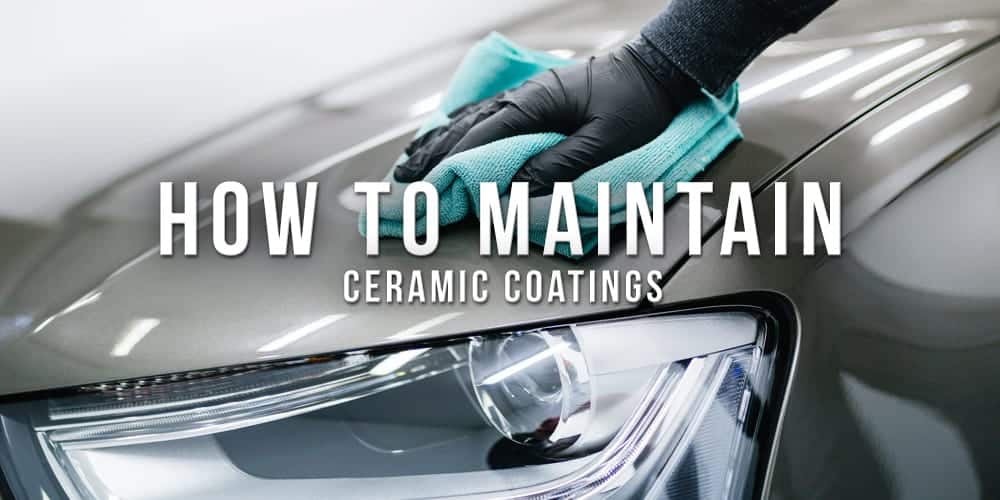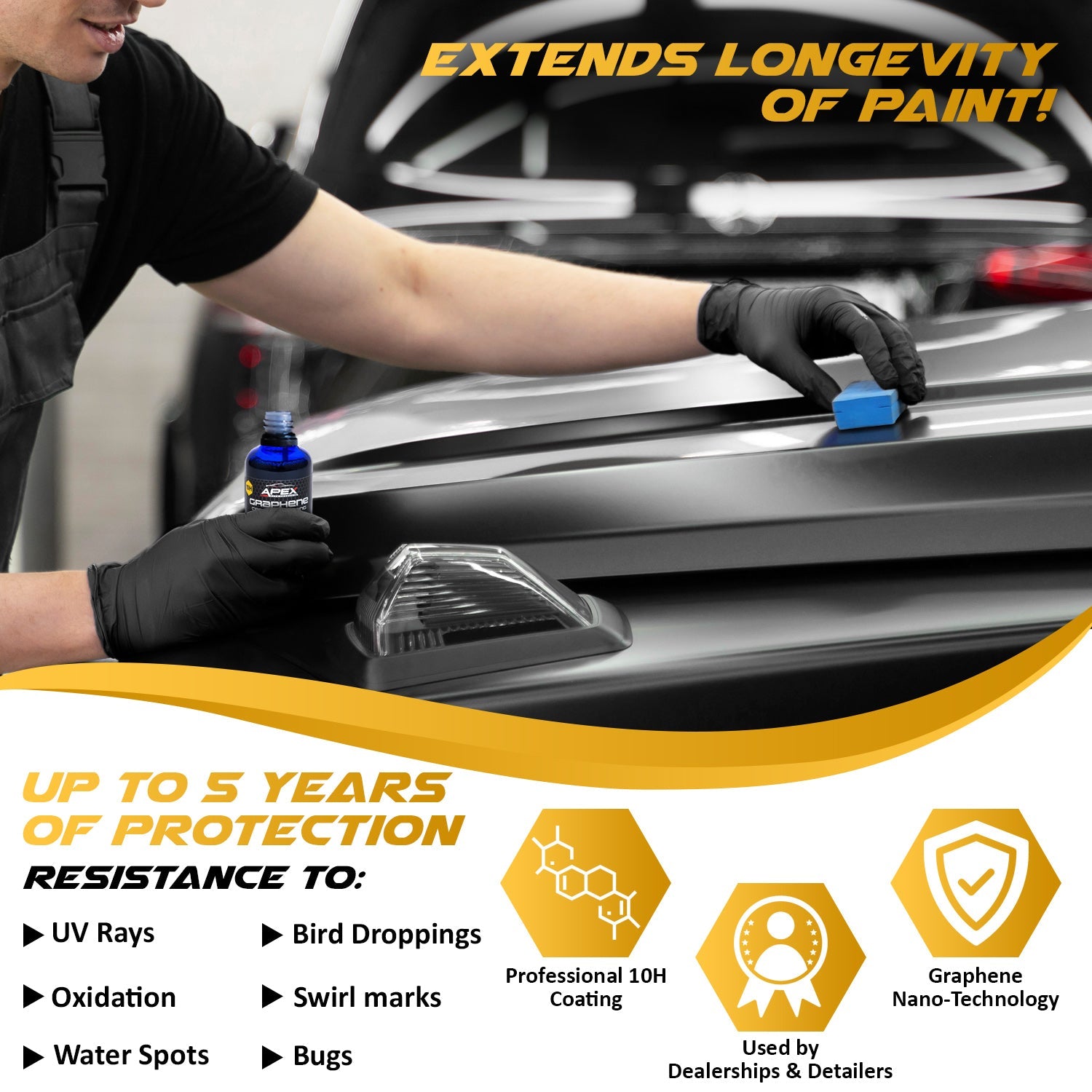Final Touch Auto Works Ceramic Coatings: The Ultimate Solution for UV and Color Damage
Final Touch Auto Works Ceramic Coatings: The Ultimate Solution for UV and Color Damage
Blog Article
The Ultimate Guide to Ceramic Coatings: Enhancing Your Automobile's Complete and Resilience
If you're looking to elevate your auto's appearance and security, ceramic finishings might be the service you have actually been browsing for. These advanced finishes bond with your lorry's paint, developing a resilient barrier against ecological damage. But how do they compare to standard wax? Understanding the advantages and application procedure can make a significant distinction in your automobile care regimen. Let's discover what makes ceramic layers a rewarding investment for your lorry.
What Are Ceramic Coatings?
Ceramic finishes are advanced safety layers that enhance your cars and truck's exterior. They're made from a liquid polymer that chemically bonds with your vehicle's paint, developing a resilient shield. Unlike traditional wax or sealants, which diminish gradually, ceramic coverings supply resilient defense against ecological pollutants like UV rays, dust, and chemicals.When you apply a ceramic finish, you're buying an obstacle that drives away water, making it easier to cleanse your vehicle and maintaining it looking more recent for longer. This technology assists maintain the stability of your paint, reducing the risk of scrapes and oxidation.Ceramic finishings come in various formulations, each designed to cater to different requirements and preferences. You can select a DIY set or choose professional application, relying on your comfort level and budget plan. In general, ceramic finishes stand for an advanced option for maintaining your lorry's visual appeal and long life.
Advantages of Ceramic Coatings
You reveal an array of benefits that go past simple aesthetics when you spend in a ceramic covering. To begin with, it offers exceptional defense versus ecological pollutants like dust, bird droppings, and UV rays, keeping your cars and truck's paint looking brand-new longer. You'll see that maintenance becomes simpler, as the hydrophobic residential properties trigger water and crud to move off effortlessly. This means much less time invested cleaning and outlining your vehicle.Additionally, ceramic finishes can boost the glossiness of your auto's coating, offering it that showroom shine. They additionally offer resistance to scratches and swirl marks, which assists maintain your vehicle's resale worth. With a ceramic coating, you're not simply shielding your financial investment; you're likewise enhancing its total appearance and long life. Eventually, this sophisticated technology guarantees your car attracts attention while appreciating long-term benefits that conventional waxes merely can't match.
The Application Process: How to Use Ceramic Coatings
Using a ceramic layer includes several crucial steps to assure excellent outcomes. Thoroughly wash your auto to eliminate any kind of dust, crud, or contaminants. This assures the surface is tidy and all set for the layer. Next off, sanitize the paint using a clay bar to get rid of ingrained particles. Later, examine the paint for flaws and polish it to accomplish a smooth surface.Once your vehicle's surface area is prepped, apply the ceramic layer in tiny areas. Make use of an applicator pad to spread out the finish evenly, following the supplier's directions. Permit the finishing to treat for the recommended time, typically in between one to 2 hours, relying on the product.Finally, prevent washing your vehicle for a minimum of a week to let the finish bond appropriately. Following these actions will help you accomplish a resilient, high-gloss surface that secures your car for years ahead.

Comparing Ceramic Coatings to Standard Wax
After ensuring your automobile's surface is completely prepped with a ceramic covering, it's time to contemplate just how this contemporary service compares to traditional wax. Ceramic finishes give a durable layer of security that lasts for many years, while wax generally supplies just a couple of weeks of sparkle. You'll see that ceramic finishings bond with your paint, producing a hydrophobic surface area that drives away water and dust, making upkeep easier.In comparison, standard wax rests on top of the paint and calls for regular reapplication. With ceramic coatings, you get exceptional scrape resistance and UV protection, aiding to avoid fading and oxidation. While the first investment for a ceramic finishing is greater, the long-term benefits usually outweigh the expenses. If you're looking for toughness and improved gloss, ceramic layers are a smart choice over traditional wax.
Maintenance Tips for Your Ceramic Covered Automobile
To maintain your ceramic-coated lorry looking pristine, regular maintenance is necessary. Beginning with a mild clean making use of a pH-balanced hair shampoo; avoid harsh detergents that can deteriorate the finishing. Utilize a microfiber clean glove to avoid scratches and constantly wash thoroughly to remove any type of soap residue.After washing, dry your auto with a soft microfiber towel to avoid water areas. Think about using a ceramic upkeep spray every few months to enhance the finishing's hydrophobic residential properties and add an added layer of protection.It's also a good idea to stay clear of automated car washes with rough brushes, as they can harm the layer. Rather, select hand cleans or touchless laundry choices. Furthermore, regularly inspect your vehicle for contaminants like tree sap or bird droppings and resolve them without delay to avoid etching. Complying with these pointers will certainly assist keep the sparkle and sturdiness of your ceramic-coated automobile for several years ahead.
Common Misconceptions Concerning Ceramic Coatings
In spite of the impressive advantages of ceramic coverings, numerous myths can develop complication for vehicle proprietors. One common mistaken belief is that ceramic coverings remove the need for maintenance. While they do supply improved defense, regular washing and treatment are still vital to keep that high-gloss finish.Another myth is that these finishes are scratch-proof. While they provide a strong layer of protection versus minor scratches, they can't go to the website hold up against extreme effects or rough materials.Many additionally believe that ceramic finishings will certainly make their vehicles immune to all impurities. In reality, they push back dust and water but won't stop concerns like bird droppings or tree sap from creating damage if left unattended.Lastly, some think that applying ceramic finishings is a do it yourself job any person can deal with, however accomplishing a remarkable application often requires expert experience to guarantee peak results.
Selecting the Right Ceramic Coating for Your Vehicle
How do you pick the appropriate ceramic coating for your vehicle? Start by taking into consideration the degree of security you need. If your automobile deals with severe weather condition or regular road trips, go with a high-end coating that uses exceptional resilience and resistance to scrapes, UV rays, and chemical stains.Next, consider the application method. Some coatings need professional installment, while others are DIY-friendly. If you're experienced, a DIY item might save you cash, however, for the very best results, an expert can assure appropriate application.Don' t neglect to check the durability of the coating. Some last a few years, while others can shield for a decade or more. Lastly, more info here review endorsements and reviews to assess customer complete satisfaction. By evaluating these variables, you'll find a ceramic finish that not only improves your automobile's appearance however additionally supplies lasting defense.
Often Asked Inquiries
For How Long Do Ceramic Coatings Last usually?
Ceramic coatings normally last anywhere from 2 to 5 years, depending on aspects like application, maintenance, and ecological problems. You'll wish to follow appropriate treatment regimens to optimize their durability and performance.
Can Ceramic Coatings Be Applied Over Paint Scratches?
You can't use ceramic finishes over paint scrapes properly. It's best to repair any type of scratches first, making certain a smooth surface - Final Touch Auto Works Ceramic Coatings. In this manner, the finishing bonds correctly and gives excellent security for your automobile's finish
Are Ceramic Coatings Safe for All Auto Surface areas?
Ceramic finishings are normally risk-free for most car surface areas, including paint, glass, and wheels. It is critical to check certain item guidelines, as some finishings could not be suitable for specific products or coatings.
Will Ceramic Coatings Protect Against UV Damage?

Can I Do Touch-Ups on Ceramic Layered Surfaces?
You can do touch-ups on ceramic coated surfaces, yet it's critical to make use of suitable products. Verify the location is tidy and comply with appropriate application techniques to keep the coating's honesty and performance. Unlike conventional wax or sealers, which put on off over time, ceramic finishes supply lasting protection versus ecological pollutants like UV rays, dirt, and chemicals.When you apply a ceramic layer, you're spending in a barrier that pushes back water, making it simpler to clean your car and keeping it looking more recent for longer (Final Touch Auto Works Ceramic Coatings). Afterward, inspect the paint for blemishes and polish it to attain a smooth surface.Once your cars and truck's surface area is prepped, use the ceramic finishing in small sections. Allow the covering to heal for the advised time, typically between one to two hours, depending on the product.Finally, prevent cleaning your car for at the very least a week to let the finish bond correctly. Take into consideration applying a ceramic maintenance spray every couple of months to boost the layer's hydrophobic residential properties and include an visit site added layer of protection.It's additionally wise to stay clear of automatic cars and truck cleans with unpleasant brushes, as they can damage the finishing. Ceramic layers are typically risk-free for the majority of car surfaces, consisting of paint, glass, and wheels
Report this page